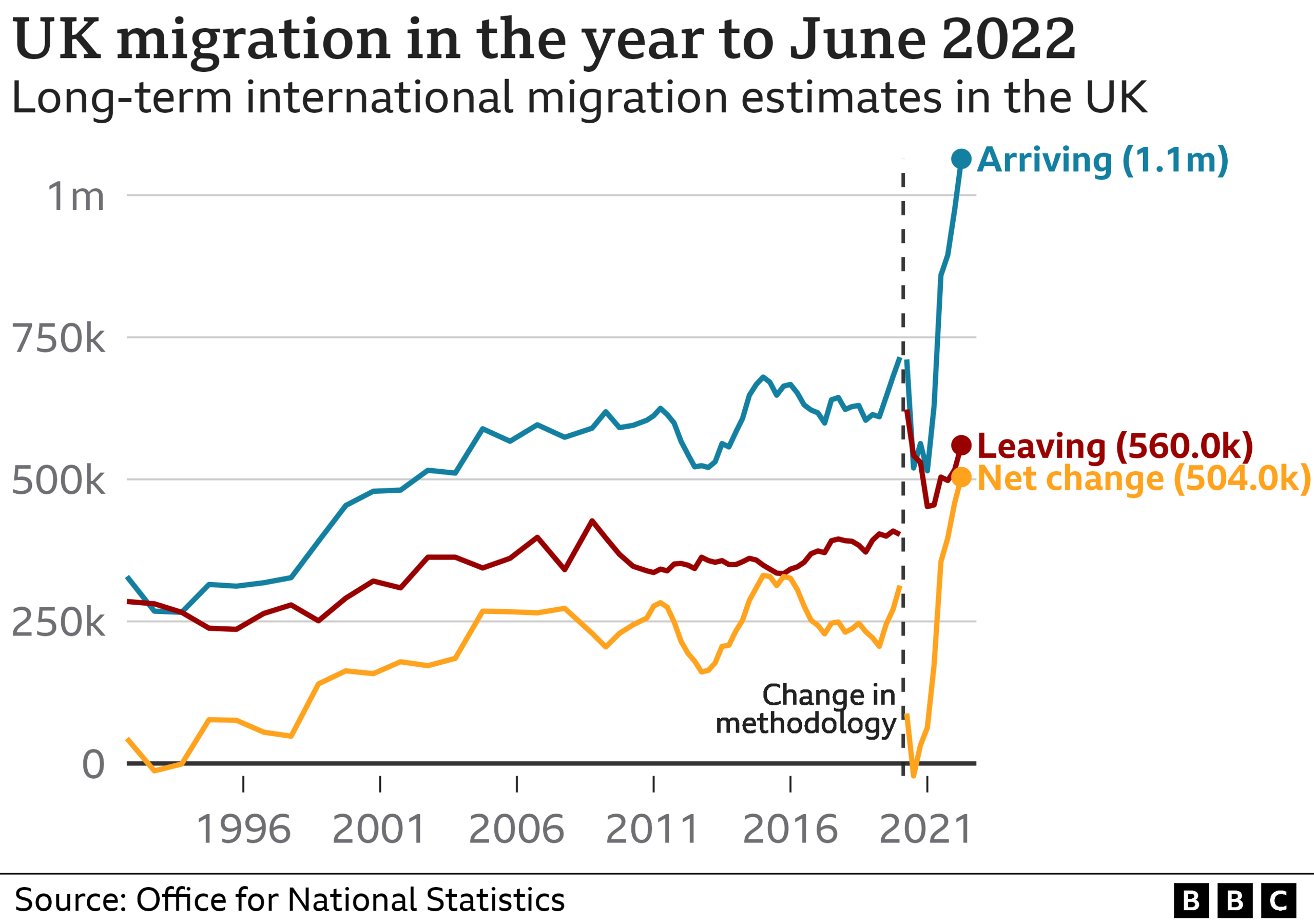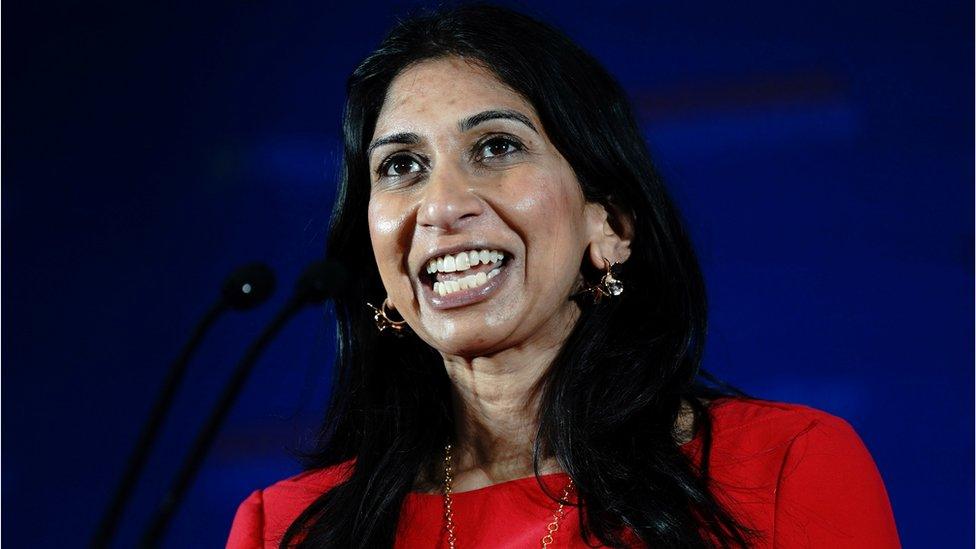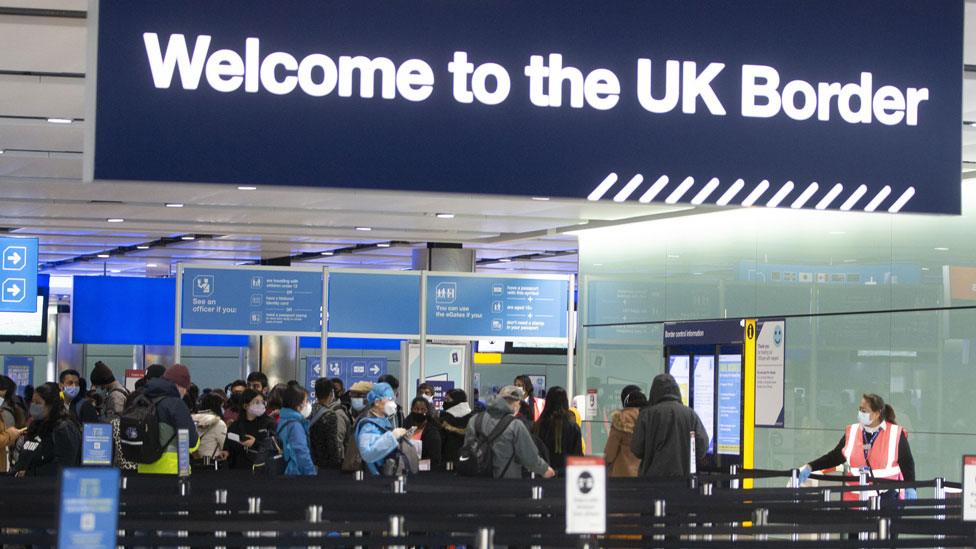Legal migration is too high, says Rishi Sunak
- Published
Watch: Rishi Sunak asked about bringing down legal migration numbers
Rishi Sunak says legal migration to the UK is "too high" but has refused to put a precise figure on acceptable levels of people coming to the UK.
The prime minister told the BBC he was "considering a range of options" to bring down legal migration.
He has been facing pressure to deliver on a 2019 Conservative manifesto commitment to bring down levels of net migration.
New figures on net migration to the UK are expected next Thursday.
In an interview with the BBC's Chris Mason at the G7 Summit in Hiroshima, Japan, Mr Sunak refused to be drawn on the specifics of the government's plan on legal migration.
Asked if he would stop some international students bringing dependants with them when they come to study in the UK, Mr Sunak said he wouldn't "speculate".
"What I would say is we're considering a range of options to help tackle numbers of legal migration and to bring those numbers down - and we'll talk more about that in the future," he said.
In their 2019 manifesto, the Conservatives pledged to bring down overall numbers of migrants coming to the UK, at which time net migration levels were at 226,000.
However, in the year to June 2022, numbers exceeded 500,000.
The rise in migration has largely been driven by people coming to the UK from outside the EU - including 170,000 Ukrainians fleeing the war in their country and 76,000 from Hong Kong, arriving under a scheme to resettle people who count as British citizens. Around 270,000 people also came to the UK to study.
The Office for National Statistics which collects the numbers said the lifting of travel restrictions after the pandemic may have triggered a bump in the number of students, but added it was too early to say if the rise represented a long-term trend.
"The numbers are too high, and we want to bring them down," Mr Sunak said, adding that figures were higher in 2022 due to Ukrainian refugees coming to the UK, something he said the country should be "proud of".
Pushed on what an "acceptable level" would be in terms of legal migration numbers, Mr Sunak said it would "depend on how the economy's doing at any particular time and the circumstances we're facing".
"So I don't want to put a precise number on it," he said, adding that tackling illegal migration was his priority.
Speaking to journalists in London, the prime minister's spokesman reiterated that Mr Sunak would not "put a number" on his preferred level of migration, but added that the PM would "take stock" after the new migration figures are released.
Earlier this week, Home Secretary Suella Braverman called for lower immigration, and suggested more British people should be trained to do jobs commonly done by overseas workers, such as lorry driving and fruit picking.
But Mr Sunak has taken a less hard-line approach, and has said more seasonal fruit pickers will be allowed to come to the UK if required.
While many in his party want to see the prime minister reducing net migration, some businesses have argued that would damage their industries, particularly at a time of low unemployment.
Speaking to the BBC's Today programme, CEO of food chain Itsu Julian Metcalfe, said difficulty finding staff was pushing prices up and some restaurants were struggling to open.
"The cost, particularly for places like Itsu, is going to be very painful for all of us," he said and urged the government to introduce a two year working visa.
Earlier this week, the prime minister used his visit to a Council of Europe meeting in Iceland to call for greater cooperation between the UK and EU on illegal migration.
Following the summit, Downing Street said the UK and the EU had agreed to work together to tackle cross-border crime and people smuggling.
Speaking to Sky News, Labour Party chair Anneliese Dodds said setting a net migration target was "not sensible".
She said an immigration system that was "working properly" could see an increase in people coming into the country to fulfil "a short-term need for skills".
"But in the medium and long-term, a reduction, because we would be training people up in our own country - we've not had that unfortunately under the Conservatives."

Related topics
- Published15 May 2023

- Published17 May 2023

